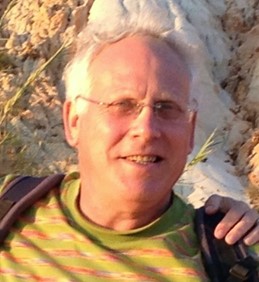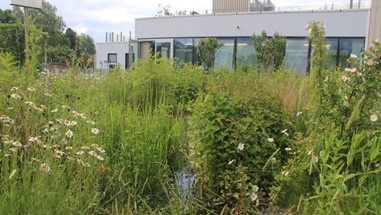Dr Benz Kotzen, School of Design , Faculty of Arts and Sciences.
 Dr Kotzen is a chartered landscape architect with over 25 years in consulting and in academia and research. His research focuses on real life environmental problems in the fields of environmental noise, landscape planning and design, particularly focusing on arid lands as well as urban applications. Landscape architects have a holistic view of the world in tackling the issues that arise, but increasingly it is evident that nature based solutions provide the answer to many of the climate based problems.
Dr Kotzen is a chartered landscape architect with over 25 years in consulting and in academia and research. His research focuses on real life environmental problems in the fields of environmental noise, landscape planning and design, particularly focusing on arid lands as well as urban applications. Landscape architects have a holistic view of the world in tackling the issues that arise, but increasingly it is evident that nature based solutions provide the answer to many of the climate based problems.
Contribution to the Sustainable Development Goals:
Benz's work supports SDG - 2 Zero Hunger, SDG -3 Good Health and Well-being, SDG - 6 Clean Water and Sanitation, SDG -11 Sustainable Cities and Communities, SDG - 13 Climate Action, SDG - 14 Life Below Water and SDG - 15 Life on Land.
My research is multifaceted but focused on finding solutions for everyday problems including climate change using tried and tested and novel technologies combined with nature -based applications.
Stockwell Green Roofs and Living Walls Centre
 The university’s new building encouraged the development of 14 green roofs. This vision of myself and colleagues has resulted in the design of one of the largest multi-functional green roofs in the world (0.5ha). We believe that in most cases that building facades and roofs should be multi-functional. Roofs and facades need to do more than keeping the weather out, and our green roofs are exemplars in using nature based solutions in reducing the urban heat island effect and growing food including fish and vegetables in our Aquaponics Labs., allowing better food security and the reduction in food miles and ecological footprints. Vertical aquaponics research has indicated increases in productivity and that exotic vegetables that are normally flown in from the Far East and which have considerable economic and environmental costs can be grown here in our cities without these transport related impacts.
The university’s new building encouraged the development of 14 green roofs. This vision of myself and colleagues has resulted in the design of one of the largest multi-functional green roofs in the world (0.5ha). We believe that in most cases that building facades and roofs should be multi-functional. Roofs and facades need to do more than keeping the weather out, and our green roofs are exemplars in using nature based solutions in reducing the urban heat island effect and growing food including fish and vegetables in our Aquaponics Labs., allowing better food security and the reduction in food miles and ecological footprints. Vertical aquaponics research has indicated increases in productivity and that exotic vegetables that are normally flown in from the Far East and which have considerable economic and environmental costs can be grown here in our cities without these transport related impacts.
My Future Contributions
My work is aimed towards solving solutions in 3 main areas:
- Restoration of lands, mainly dry and arid lands that have been denuded of natural vegetation through climate change/drought as well as poor land management. This problem exists on a vast scale requiring new and novel methods of restoration and international collaborations. This research also includes providing water through dew.
- Nature based biophilic solutions, mainly to mitigate the urban heat island effect (UHI), but also improving quality of life, health and wellbeing of citizens by locating plants into, in, on and around buildings. Work also includes research into the efficacy of living walls to reduce the UHI and exploring government policy changes by incorporating green infrastructure into buildings and the environment, based on the accepted principal that ‘the polluter pays’. Those who mitigate the UHI are incentivised and those who add to negative environmental effects would be penalised.
Work in aquaponics will continue in 4 directions: 1) providing economically sustainable community based alternative livelihoods in African cities and villages, 2) in the UK, creating new community based aquaponic facilities to provide new jobs and to foster education and opportunities in correctional facilities and schools, and 3) researching aquaponics and the circular economy, and 4) aquaponics on Mars – fish waste provides the fertilized for soil based crops
To solve the climate crisis collectively we will need to
If we humans lived to be 1000 years old, it is unlikely we would ignore the climate change evidence. People have an annoying habit of ‘kicking the ball down the road’ to be fixed later. But climate change has been identified as an issue for many years now, and if we are at the tipping point of no return where irreparable damage will be caused, we need to act immediately. The only way to mitigate and avoid catastrophe is through collaboration. This means that everyone is responsible to do what they can and it is particularly incumbent on educationalists, academics and researchers that their work encompasses the issues. The situation is so dire that no one has the right to turn a blind eye. There is a problem, there are solutions and innovative responses. So, let’s get on with it.
Sustainability and my work to support Sustainable Development Goals are important to me because
Whilst we all need to play our part in developing sustainably, I am privileged to have been educated and trained in landscape architecture where we are bound to plan, research, design and implement projects that benefit both people and the environment. I am very aware that working in the School of Design, I have the opportunity to undertake the research that fulfils my ambitions both individually and collaboratively.
I believe very strongly that individuals can change the world even if it is in a small and local way. Until climate change is rectified and our planet is on an even keel, I strongly believe that all development needs to be based on sound sustainable principles.

